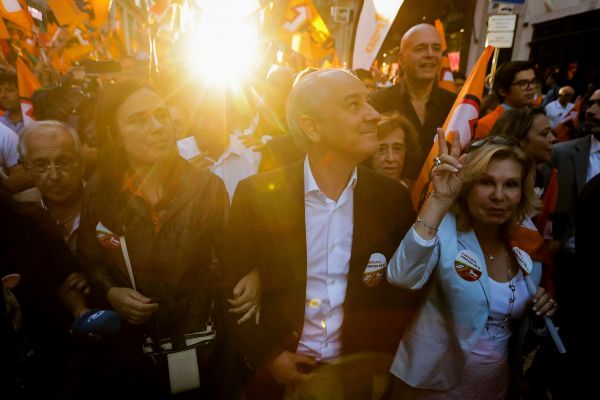- Portugal.The Portuguese Socialist Party will denounce the old man who rebuked Prime Minister Costa at the close of the campaign
- Wide angle.The Portuguese miracle fire test
This Sunday the national elections will be held in Portugal and everything indicates that the Socialist Party (PS) of Prime Minister António Costa will be the most voted formation. Although the polls indicate that they will not be done with the absolute majority so longed for , they will continue to control the Government: although the famous geringonça - the alliance of the parliamentary left that has kept Costa in power since 2015 - has been dissolved, nobody doubts that the deputies of the Left Bloc (BI), the Portuguese Communist Party (PCP) and the Party of People, Animals and Nature (PAN) support the investiture of a second minority Executive of the current prime minister.
While Costa prepares to celebrate its continuity in Palacete de São Bento, in the ranks of the Portuguese right the electoral forecasts only inspire fear, since they predict the historical defeat of the Social Democratic Party (PSD) of Rui Rio and the Social Democratic Center ( CDS) by Asunção Cristas. In the worst case scenario, both formations could lose about thirty deputies and remain in control of just 86 of the 230 seats of the Republic Assembly, which would remain firmly in the hands of the Portuguese left.
A lost opposition
The collapse of the Portuguese right is a slow-motion drama that has been going on since the last legislative elections, in which the conservative coalition composed of the PSD and CDS was the most voted, but it remained eight seats from the absolute majority . The unusual alliance of the feisty Portuguese left resulted in the investiture of the minority Executive of Costa. Conservatives predicted that the government would collapse in a matter of months, but it has finally turned out to be surprisingly stable and, four years later, can boast the timid recovery of the Portuguese economy . That reality has left the right without a narrative capable of counteracting the triumphalism of Costa and his left alliance.
"The conservatives are in shock , and maybe they have been like this since 2015, because they do not seem to have overcome the trauma that led to the loss of a government they thought belonged to them," says Luis Rosa, political chronicler of the Observer newspaper. "Neither the PSD nor the CDS have managed to oppose Costa effectively ."
Rosa points out that the conservatives were quick to realize that the Socialists - who had promised to "turn the page to austerity" - had adopted economic policies very similar to theirs.
"The conservatives predicted that the left would provoke a new economic crisis, but the Executive ended up betting on an economic policy of light austerity. In order to regain the confidence of financial institutions he made fiscal rigor his flag and focused on reducing of the deficit and the balance of public accounts . "
"Although it approved the odd social measure, Costa maintained - and in some cases deepened - the cuts introduced by the Social Democrats. The economic policies turned out to be a success and were applauded by Brussels, a situation that left the Portuguese right without its main line of attack: that of the supposed fiscal irresponsibility of the Socialists. "
Lack of direction
During this term internal wars and identity crises have eroded social democrats and conservatives. Since its election to the leadership of the PSD in 2018, Rio has been attacked for having an excessively conciliatory position with the Socialists, and for being open to closing formal pacts with Costa. Meanwhile, the radicalization of the youth of the CDS - who recently launched a surprisingly aggressive campaign against a law that would expand the rights of Portuguese transsexuals - has raised questions about the ideological orientation of the Cristas party.
"The CDS is not clear about what it wants, while the Rio PSD is presented as a kind of Socialist Party B," concludes Rosa. " That disorder has burned many militants , who now contemplate giving their vote to new formations such as Aliança [of former Social Democratic Prime Minister Pedro Santana Lopes] or the Liberal Initiative."
The political scientist and jurist Nuno Garoupa believes that the greatest danger to the right is the abstention of its historical voters. "The right is paying for its current internal crises, but also for the austerity of the Troika era, and for not taking advantage of its time in power to carry out structural reforms, such as strengthening the judicial system in the fight against corruption ".
" Their disappointed voters stayed home in 2015 - when the right lost 700,000 voters - and it seems that history will be repeated this year. There is no transfer of votes to the Socialists, who have not increased their electoral support base."
"The day that the right is recomposed, bet on new leaders and present a program with reformist proposals, it will win. Until then, the left can do what it wants: the conservatives are not there and they are not expected ."
According to the criteria of The Trust Project
Know more- Portugal
PORTUGAL The Portuguese Socialist Party will denounce the old man who rebuked Prime Minister Costa at the close of the campaign
Wide Angle The Portuguese miracle fire test
Spain Pablo Casado reproaches Albert Rivera for his "irresponsibility" by rejecting his "electoral offer"

